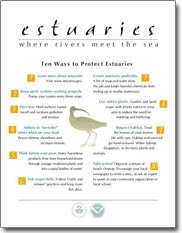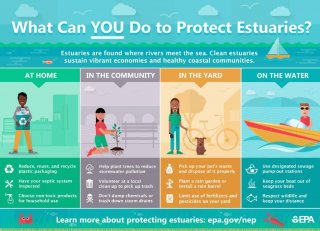What You Can Do to Help Protect our Coastal Watersheds and Estuaries
Here's what you can do to protect our coastal watersheds and estuaries, our priceless resources:
At Home:
- Conserve water in your daily life.
- Install water-saving toilets and showerheads.
- Replace dripping faucets and leaky pipes.
- Dispose of household and yard chemicals properly; follow disposal directions on their labels.
- Don't be wasteful: reduce, re-use and recycle every day.
- Pick up trash; participate in trash clean-up days.
- Cut up the rings of plastic six-pack holders so that aquatic life and birds cannot become entangled in them.
- Respect your sewer system: don't pour toxic wastes, chemicals or any medications down the toilet.
In Your Garage and Yard:
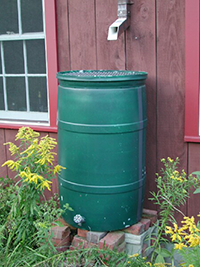
- Maintain your cars and other heavy equipment to reduce oil leaks.
- Minimize use of fertilizers and pesticides on your yard.
- Water your lawn conservatively and keep grass clippings out of street gutters.
- Have your septic system inspected to make sure it is operating properly.
- Avoid pouring fats, grease or solids down the drain.
- Build a rain garden in your yard or install rain barrels.
On the Water:
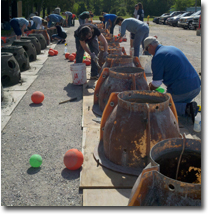
Photo Credit: Nancy Laurson
- Don't dump your trash overboard; dispose of properly and recycle.
- Maintain your boats to reduce oil leaks.
- Keep your boat or motorized watercraft out of sensitive areas like seagrass beds.
- Install and maintain marine sanitation devices on your boat.
- Use designated pumpout stations.
- When visiting coral reefs, do not touch living coral.
In Your Community:
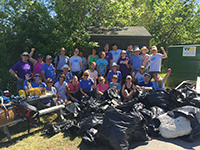
- Volunteer with your local environmental organizations.
- Pick up trash; participate in trash clean-up days.
- Help plant trees or seagrass, or remove invasive vegetation.
- Don't litter: streets and storm drains empty into rivers and streams that drain into our estuaries.
- Pick up your pet's waste.
- Do not dump petroleum products, including oil, down storm drains; recycle used motor oil.
- Remember gutters and storm drains deliver water and contaminants to streams, rivers and eventually the ocean.
When Shopping:
- Use reusable bags rather than paper or plastic ones.
- Choose non-toxic products for household use.
- Choose products carefully: avoid excess packaging.

